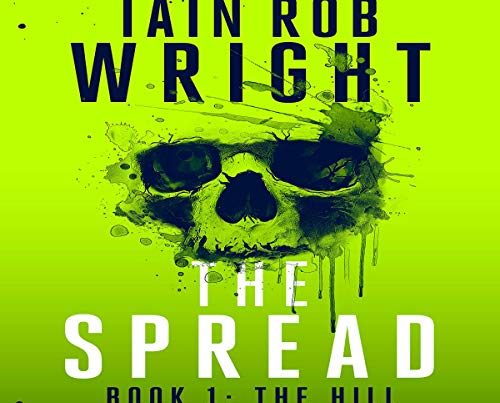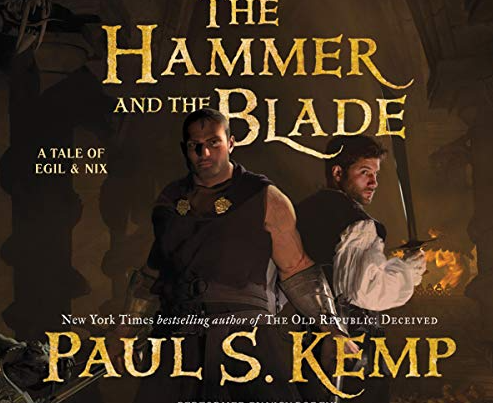From the Parallel Worlds Magazine archives.
We live in a weird time. We have terrorist attacks, a resurgence of populism, social media, and generations that are as disconnected from each others’ experiences as ever. A once-in-a-century pandemic entirely reshaped our lives in less than a year, and similar threats might follow. Even as quality of life rises, satisfaction with life is spiralling. As it always has, fiction reflects its moment; even speculative and escapist fiction serves as a mirror of the era it emerges from.
In some ways, Bryony Pierce’s first entry in a new young adult urban fantasy series is deeply rooted in the past. As nightmarish apparitions pour into the world through an apparent crack in the boundaries of reality, our plucky main character Ivy Mann stands ready to fight them off with “bell, book, and candle.” Terrifying monsters are beaten back by written-out recitation of Christian Scripture, just as one might expect to see in classic horror morality tales. Latin incantations, runic symbols, and ritual sacrifice — the magic system itself should be familiar to any reader of classic fantasy, and there aren’t any innovative twists on the system. In that way, Raising Hell is a continuation of stories that have been told for decades.
Where the book really captures, and where it succeeds, is in the experience of its protagonist, Ivy. Ivy is nineteen. She’s perfectly isolated at that between-age, where you’re an adult but technically a teenager. Ivy’s experiences manage to encapsulate that moment in time, with particular resonance for people growing up at this moment in history.
Young adults today deal with the same emotional traumas that Ivy is going through. Many feel looked-down upon, and given the short end of the generational stick. They’re just at the start of their careers and are trying desperately to prove their expertise, even as they grapple with making the stupid mistakes that come with inexperience. Everyone younger seems spoiled and ignorant, while everyone older seems out-of-touch and immoral. Young adults’ own emotions, too, are inconsistent and confusing, but one thing is persistent: guilt. Guilt over past transgressions, real or perceived. Guilt for poor decisions made, friends hurt, and dreams laid to rest. As Ivy struggles to do her part to hold together a world that just seems to be getting worse all the time, she finds herself figuratively and literally hounded by these past traumas and is desperate to keep them from occurring to others who’ve not yet seen what she’s seen and done.
Where the book really captures, and where it succeeds, is in the experience of its protagonist, Ivy.
The book does invite certain comparisons to Jim Butcher’s Dresden Files. Like Harry Dresden, Ivy is a wounded animal almost from page one, as she puts herself grimly in the path of danger to guard innocents (and not-so-innocents). She is a more ‘Gen Z’ version of Dresden, though: scarred by a frightening world, and less prone to humorous references than irritated quips and sarcastic dismissal. She is likeable as the underdog, with some level of competency in the war she fights but feeling the constant drain of her own blood literally leaking from her wounds — along with occasional panic at the razor-thin precipice her fledgeling career sits upon. She struggles with difficult decisions and blockages from her own past traumas, desperate not to make new mistakes or repeat old ones. Along the way, a cast of supporting characters fail to particularly distinguish themselves, from an out-of-touch and threatening rich boy who becomes something more to an old lady trapped in a cat who, while amusing and generally unhelpful as we would expect such a character to be, only has passing levels of character development.
It must also be noted that there isn’t much real character to this world’s magic system. Spells are unearthed from centuries-old tomes, invoked with Wiccan-style processes, and generate predictably grim side effects; though in this world we see the novelty of teenagers, the same risk-happy idiots that we all roundly condemned for eating Tide pods (google it) being the only humans capable of performing that magic. Add in a healthy dose of political nightmare that seems a constant refrain in today’s media-swamped, polarised environment and a dab of not-quite-dead British colonialism and we have a hostile world spiralling around England and our unfortunate protagonist, for whom a snarkily-named machete doesn’t seem like nearly enough of an arsenal to confront pressing threats.
The style of writing itself isn’t masterful but is well-suited to the audience. Plot twists are confounding enough to mislead less-savvy readers, but aren’t the ‘Snape kills Dumbledore’-level twists that completely reshape the story; more gentle turns that keep the story moving along the same highway. Character motivations are largely surface-level and revealed with simple expository dialogue. Unveiled mysteries don’t inspire the reader to cry “ah ha!” having finally noticed the bread crumbs laid down along the way, but invoke an “oh, sure, makes sense” of the author pointing to a seemingly-minor plot thread. The plot largely relies on tried-but-true tropes to draw out a narrow-scope story centered around a few scant locations. The monsters, while appropriately horrifying, are not gruesomely so, and don’t evoke the same creeping dread as the phantoms and villains of other works like They Who Walk Behind from The Dresden Files or Kronos from the Percy Jackson and the Olympians series. Developments in Ivy’s relationships with other characters also fail to surprise, following established tropes that lean towards escapism and fantasy — not necessarily a bad thing from this publication’s perspective, but they ring hollow for a story that is otherwise perfectly willing to indulge in gritty gore and carnage.
Still, Ivy Mann provides an authentic emotional core for an aspirational young reader feeling trapped in an unfriendly world. A magic-stricken London is captured with some consideration for how a sudden emergence of magic would transform our modern, interconnected society. A real sense of racing to save lives from a hostile world, a competent but inexperienced protagonist, a dose of classic zombie siege warfare and a suitably dramatic finale combine to form an enjoyable read. The story pulls many of its narrative threads to a surprising close, but dangles a tantalising few that provide intriguing sequel potential.
Bryony Pierce’s first entry in her new series doesn’t deliver many new or innovative concepts, but captures the experience of young adulthood in a way that is likely to resonate with young readers.






